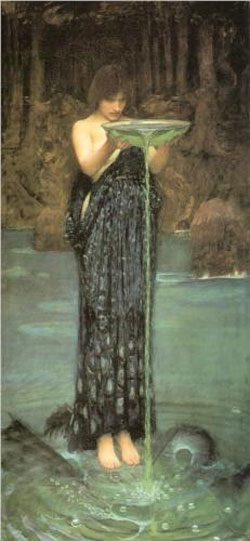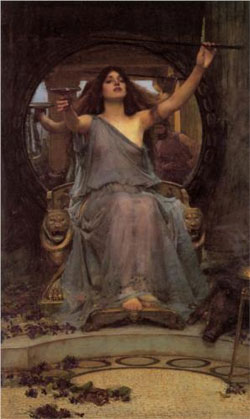Circe in the Odyssey
The Odyssey was most likely composed in the 8th century BCE about the Heroic age of the 2nd millennium BCE, meaning Homer wrote about events that were 500 years before his time. He based his tale on oral traditions – the myths, folk tales and legends – that were circulating at the time.
Circe, the daughter of the Sun, one of the Titans, is a beautiful seductress similar to Calypso. She decides in Book 10 – in the first magical operation recorded in Greek history – that she’d like to change Odysseus and his companions into swine. To perform her magical operation, she mixes a drug into the special cheese mixture she serves Odysseus’ companions. She then touches them with her wand, though utters no chant or spell. Odysseus protects himself by using a magical herb moly. Additionally, Circe has the ability to predict the future.
Circe in Ovid’s Metamorphoses
Ovid describes the encounter in Book 14 of his Metamorphoses
“When she saw us, and words of welcome had been received, she smiled at us, and seemed to give a blessing to our desires. Without delay she ordered a drink to be blended, of malted barley, honey, strong wine, and curdled milk, to which she secretly added juices, that its sweetness would hide. We took the cup offered by her sacred hand. As soon as we had drained it, thirstily, with parched lips, the dread goddess touched the top of our hair with her wand, and then (I am ashamed, but I will tell you) I began to bristle with hair, unable to speak now, giving out hoarse grunts instead of words, and to fall forward, completely facing the ground.
I felt my mouth stiffening into a long snout, my neck swelling with brawn, and I made tracks on the ground, with the parts that had just now lifted the cup to my mouth. I was shut in a sty with the others in the same state (so much can magic drugs achieve!) We saw that only Eurylochus had escaped the transformation: the only one to avoid the proffered cup. If he had not refused, I would even now be one of the bristly herd, since Ulysses would not have heard of our plight from him, or come to Circe, as our avenger.
Peace-loving Cyllenian Mercury had given him the white flower, the gods call moly, that springs from a black root. With this, and divine warnings, he entered Circe’s house in safety, and, when he was asked to drink from the fateful cup, he struck aside the wand, with which she tried to stroke his hair, and scared off the frightened goddess, with drawn sword. Then they gave their right hands to each other, as a pledge of good faith, and after being received into her bed as her husband, he asked for his friends true bodies to be restored, as a wedding gift.”
Odysseus’ Descent into Hades

In Book 11, Odysseus performs the first necromantic ritual recorded, in the manner that Circe described. He digs a shallow ditch to serve as an access to Hades and pours milk, honey, wine, and the blood of a black ram around it. The ghosts, eager to drink the concoction, are distracted and Odysseus magically descends into Hades to talk to the dead and learn of his future.
“There Perimedes and Eurylochus held the victims, but I drew my sharp sword from my thigh, and dug a pit, as it were a cubit in length and breadth, and about it poured a drink-offering to all the dead, first with mead and thereafter with sweet wine, and for the third time with water. And I sprinkled white meal thereon, and entreated with many prayers the strengthless heads of the dead, and promised that on my return to Ithaca I would offer in my halls a barren heifer, the best I had, and fill the pyre with treasure, and apart unto Teiresias alone sacrifice a black ram without spot, the fairest of my flock. But when I had besought the tribes of the dead with vows and prayers, I took the sheep and cut their throats over the trench, and the dark blood flowed forth, and lo, the spirits of the dead that be departed gathered them from out of Erebus. Brides and youths unwed, and old men of many and evil days, and tender maidens with grief yet fresh at heart and many there were, wounded with bronze-shod spears, men slain in fight with their bloody mail about them. And these many ghosts flocked together from every side about the trench with a wondrous cry, and pale fear gat hold of me. Then did I speak to my company and command them to flay the sheep that lay slain by the pitiless sword, and to consume them with fire, and to make prayer to the gods, to mighty Hades and to dread Persephone, and myself I drew the sharp sword from my thigh and sat there, suffering not the strengthless heads of the dead to draw nigh to the blood, ere I had word of Teiresias.”
Reference
- Luck, Georg. “Witches and Sorcerers in Classical Literature.” Witchcraft and Magic in Europe: Ancient Greece and Rome. University of Pennsylvania Press (November 1999) ISBN: 0812217055
- Robert Fagles (Translator), Bernard Knox (Introduction). The Iliad/the Odyssey. Penguin USA (Paper) Boxed edition (November 1999). ISBN: 0147712556
- Ovid, A. D. Melville (Translator). Metamorphoses. Oxford Press; Reprint edition (June 1998) ISBN: 019283472X












 What is a Sorcerer?
What is a Sorcerer?